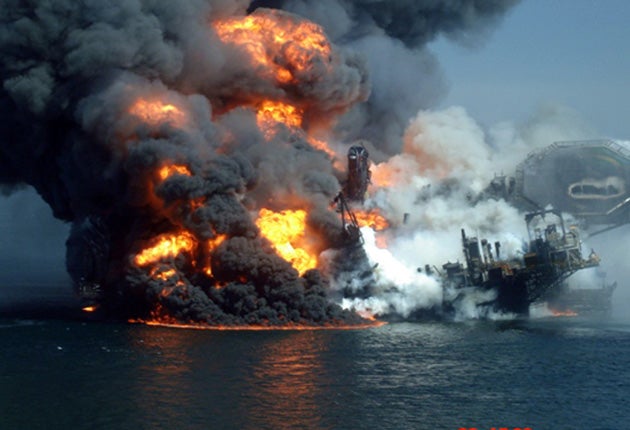Violent hurricanes could hamper oil clean-up

Your support helps us to tell the story
From reproductive rights to climate change to Big Tech, The Independent is on the ground when the story is developing. Whether it's investigating the financials of Elon Musk's pro-Trump PAC or producing our latest documentary, 'The A Word', which shines a light on the American women fighting for reproductive rights, we know how important it is to parse out the facts from the messaging.
At such a critical moment in US history, we need reporters on the ground. Your donation allows us to keep sending journalists to speak to both sides of the story.
The Independent is trusted by Americans across the entire political spectrum. And unlike many other quality news outlets, we choose not to lock Americans out of our reporting and analysis with paywalls. We believe quality journalism should be available to everyone, paid for by those who can afford it.
Your support makes all the difference.Meteorologists in the United States are warning of an unusually active hurricane season this summer, stirring concerns that just one severe tempest at sea early on could cripple ongoing operations by BP and the US government to plug the crippled oil well in the Gulf of Mexico and contain the already giant spill.
"All efforts on the shoreline and at sea, the booms and structures and rigs involved in clean-up and containment could stop working," said Ian MacDonald, a professor of oceanography at Florida State University. "If a storm comes into this situation it could vastly complicate everything."
Executives for BP said last night that a tube successfully inserted into the mouth of the well's riser pipe over the weekend was capturing roughly one fifth of that leak and delivering the oil and the gas to a tanker above. They expressed hope that the quantity of oil entering the pipe would increase in the coming days. While it represented a first bit of encouraging news, officials in Washington said the tube was "not a solution" to the problem.
The pressure on BP from Washington to do more to end the leak and step up containment measures continued. Yesterday US President Barack Obama announced plans to create a presidential commission that would investigate the Gulf of Mexico oil spill and study industry practices and the potential role of government oversight.
"We will not rest until BP permanently seals the wellhead, the spill is cleaned up, and the communities and natural resources of the Gulf Coast are restored and made whole," the Secretary of Homeland Security, Janet Napolitano, and the Secretary of the Interior, Ken Salazar, said in a joint statement. But BP sought to emphasise that its success with the tube so far is just a first step. "This is just containing the flow; later this week, hopefully before the end of the week, we'll make our next attempt to actually fully stop the flow," the chief operating officer, Doug Suttles, told NBC News. Deadlines were meanwhile being set by Mother Nature. The hurricane season, which most commonly sees storms entering the Gulf of Mexico from the Atlantic, begins on 1 June, two weeks away.
Because of data showing a diminishing of the El Niño effect this year and a slight warming of waters in the Atlantic, scientists are agreed that the season is shaping up to be unusually active. Separately, BP was being told that parts of the vast slick created by the leak are now within a few miles of, or may already be in contact with, the so-called Gulf loop – deep currents circulating in a clockwise direction. Like a conveyor belt, the current may quickly begin to move some of the oil towards the Florida Keys. Thereafter, the Gulf Stream could carry it round to Miami Beach and the eastern seaboard of Florida.
"This can't be passed off as an 'it's not going to be a problem'," said William Hogarth of the University of South Florida's College of Marine Science. "This is a very sensitive area. We are concerned with what happens in the Florida Keys." The Keys are home to the largest coral reef in the United States. They are also a tourism hub.
Distress over the crisis has only deepened since scientists aboard a research ship in the Gulf reported finding plumes of oil hovering between the sea bed and the surface, some as much as ten miles long and 300 feet thick.
Among the myriad questions not yet answered is how a major hurricane would affect the slick. Some experts believe a severe storm would break up much of it, which would make containing it and cleaning it up even more difficult. By contrast, it is possible that oil on the surface could impede heat transfer into the atmosphere and therefore lessen the intensity of any hurricane that enters the Gulf.
Join our commenting forum
Join thought-provoking conversations, follow other Independent readers and see their replies
Comments